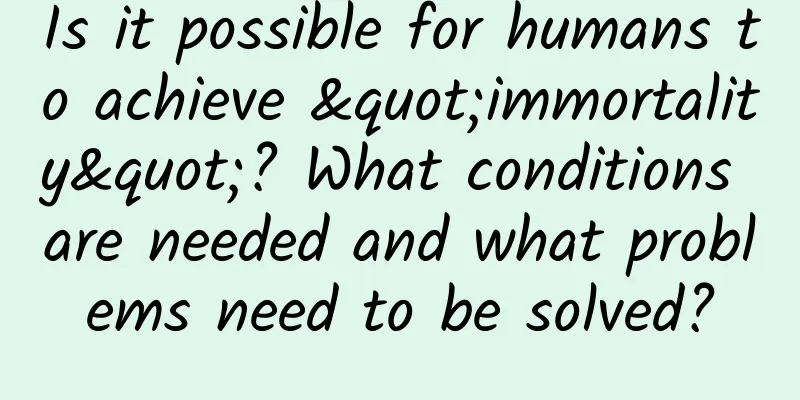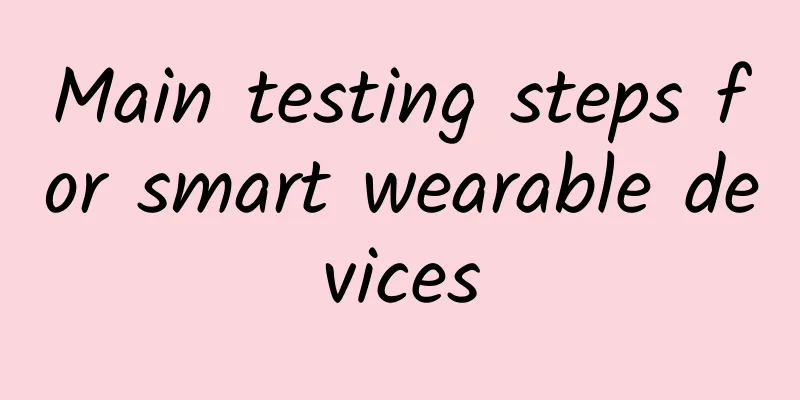Is it possible for humans to achieve "immortality"? What conditions are needed and what problems need to be solved?

|
When I see some friends answering questions like this, they emphasize the issue of money. In fact, power and money may extend a person's lifespan a little, but they have nothing to do with the topic of "immortality". Whether or not humans can achieve the goal of "immortality" in the future, the only way to work towards this direction is through science and technology. Only the development of science and technology can make humans healthier and longer-lived, and perhaps eventually enable humans to achieve the goal of "immortality". Therefore, the most basic and important condition for humans to achieve "immortality" is the development of science and technology. Of course, I put "immortality" in quotation marks because there is no such thing as true immortality in our universe. The universe itself also has a beginning and an end. It is now 13.8 billion years old. Although no one knows how long it will last in the future, one thing is certain: according to the modern standard cosmological model theory, the universe will die. Since the universe cannot be immortal, human "immortality" can only be relative. The emperor asked people to cheer for him, if this kind of "immortality" is possible in the future. If people want to achieve "eternal life", the most important problem they need to solve is how to separate consciousness from the body and survive. Almost all normal people, no matter how old they are, as long as they are not stupid or demented, their brain consciousness is clear. What does this mean? It means that in almost all deaths, the body dies first, and human consciousness exists attached to the body (brain). As long as the body dies, the consciousness will also dissipate. Consciousness is extremely important to human beings. To put it more seriously, consciousness is the key to determining whether a person is "alive". The current medical standard for death is brain death, which means the absence of consciousness. Humans have a self only when they have consciousness. What is a self? It is knowing that you are yourself and that you are different from other people or any other animal creatures. Therefore, when a person dies, it is the "I" who dies. This kind of self-awareness is the most important foundation of human consciousness, the essence that distinguishes it from other animals, and the most critical genetic mutation and evolution for humans to become intelligent creatures. Based on self-awareness, humans have memory, experience, and logical thinking. The tool that makes human consciousness more and more mature is language, and the basic cell that makes up language is concepts. People all over the world can communicate because of language and concepts. For example, when we talk about tables, cars, or eating, drinking, defecating, and urinating, we can translate them into different languages and people all over the world will know what they mean. Thinking and experience memory are formed by relying on language concepts and time marks, which is something that all other animals do not have. Some people insist that animals also have thinking and memory, which is completely groundless. Therefore, consciousness is the soul unique to human beings. When consciousness exists, people are alive, even if their whole body is dead, such as Hawking who suffers from amyotrophic lateral sclerosis, who is still alive except for his eyeballs moving. When consciousness dies, even if the body is not dead, such as mental patients and vegetative patients who have become walking corpses, they are actually dead. The current scientific longevity methods, whether through gene therapy or any other medical means, are basically trying to make the body live longer. But after a long time, the body will eventually be riddled with holes and ultimately beyond salvation. Some life or medical research believes that the human body's life limit is about 150 years. If science and technology are only used to repair the human body, there will never be hope for "immortality". Therefore, if humans want to achieve eternal life, they must give up their bodies and leave their consciousness. This is the only way to achieve "eternal life". Can consciousness exist apart from the body? Baidu has now defined consciousness uploading as "a technology that will soon be realized," which means it is no longer pure science fiction. Many top research institutions and scientists in the world are studying this topic and have made some progress and breakthroughs. Ray Kurzweil, head of engineering at the famous Silicon Valley technology company Google, is an active promoter in this regard. He and a team are studying uploading human consciousness to computers, claiming that it will be achieved as early as 2045. As early as 2011, Russian tycoon Dmitry Itskov launched an astonishing "Russia 2045" plan, also known as the "Avanti Project", which cost a huge amount of money to hire at least 30 scientists. The goal was to upload one's own consciousness to a computer and create a virtual person in one's own image, and eventually merge one's own consciousness with this virtual person to achieve "eternal life." Elon Musk, the world's richest man and real-life Iron Man, has not only created a giant starship to fly to Mars, but is also working on the development of brain-computer interfaces, which are actually a brain-computer combination technology that has been successfully tested on pigs and monkeys and has been approved by the US FDA (Food and Drug Administration) for human trials. Musk believes that the probability that humans will not enter computer virtual systems in the future is only one in billions. Robot scientist Peter Scott-Morgan is a patient with amyotrophic lateral sclerosis (ALS). Before his disease became hopeless, he used his knowledge to convince doctors and formed a scientific team to transform his body into a "cyborg." The so-called "cyborg", also known as a biochemical man or an electronic man, is a combination of an organism and a machine, which uses the consciousness of the organism to command and control the machine to enhance the ability of the organism. Peter calls himself the first "cyborg" in human history, and calls his organism Peter 1.0, and the combination of his consciousness and the machine Peter 2.0. In 2019, Peter 1.0 "died" and Peter 2.0 came online. The only useful parts of his body were his head and brain, and only his eyes could move. His language and writing abilities, eating, drinking, defecating, urinating, and respiratory system were all maintained by machines. Peter has published a book called Peter 2.0, a 324-page autobiographical book translated into Chinese. The last third was completed by Peter 2.0 after Peter 1.0 "died". Peter 2.0 plans to live forever, and in the future he will launch Peter 3.0, so that when his lesbian "wife" Frances grows old in 50 years, they can reunite in the virtual world. Robin Hanson, an economist dedicated to studying the future of humanity, once envisioned a hypothetical world in which, after the human brain consciousness is uploaded to a computer system, all work will be done by a disembodied simulated human consciousness, and human life will be digitized, just like what is described in the movie "The Matrix." However, the path to consciousness transfer is still full of difficulties. Although scientists with advanced consciousness are full of confidence in consciousness uploading, there are still many insurmountable gaps to truly achieve it. The most important difficulty is how to separate consciousness from the human brain, especially self-consciousness. If the problem of transferring self-awareness cannot be solved, and all of a person's thinking habits and memories are simply transferred to a computer, it can only be a simulated virtual person, not the person himself who is "alive". But it is not easy to strip away a person's self-awareness. So far, there has been no case of a person's main consciousness surviving without the brain. Only the human brain can "feed" consciousness, and consciousness will die without the human brain. The human brain is an extremely complex structure, with more than 80 billion nerve cells, and neurons are connected to more than 10,000 other neurons through branches called axons and dendrites. Therefore, even if the structure of the human brain is rigidly replicated, it is a huge problem, and even with such a complex "circuit map", its operating mechanism is still an even more complicated problem. Moreover, does human consciousness really exist entirely in the human brain? Modern research has also found more uncertainties. For example, research has found that the human digestive system contains 100 million nerve cells. Could these be part of the generation and existence of consciousness? Some people who have undergone heart transplants have also shown a trend of personality and memory changing towards the donor. How much do these have to do with consciousness? All of this remains to be deciphered by future science, so it is still uncertain when human self-awareness will be able to "go online." Can consciousness be "immortal"? As mentioned before, there is no immortality in the universe, so consciousness cannot be truly immortal, it can only be relatively "immortal". So once human consciousness can be transferred or uploaded, how long can it "live"? A person with a normal brain will still be conscious and clear before death, which means that consciousness at least "lives" longer than the body. In other words, if humans can eventually invent a device that can "keep" consciousness alive, will consciousness be immortal temporarily or forever? In other words, will consciousness also age? There is no evidence that consciousness will age, but consciousness is very "delicate" and will dissipate with the death of the human brain, which means it cannot be separated from the human brain as a carrier. My idea is that if we can really create a carrier that can "feed" consciousness and fully meet the energy required for the existence and activities of consciousness, consciousness may exist forever. Of course, this eternity cannot be compared with the universe, it may be 10,000 years or 100,000 years. But since consciousness is so "delicate", it is difficult to "maintain". If there is a small mistake, such as power failure or short circuit somewhere, it will disappear. How to make the consciousness carrier run perfectly and smoothly is perhaps the most important public relations subject before and after the successful transfer of consciousness. In the long-term "survival" process, consciousness will inevitably encounter various problems, just like the human body will get sick and encounter accidents, which will affect its lifespan. But it is obvious that the survival period of consciousness is incomparable to that of the body. I have said many times in the past that human beings leaving their bodies and existing in a conscious way is a major upgrade of human civilization and a prerequisite for long-distance interstellar travel. Once humans leave their bodies, not only will their lifespan be elevated, but all their consumer needs and tools will also change greatly. Interstellar travel will no longer require huge starships, and a small starship can carry thousands of souls. The consciousness of all human beings can be united through wireless networks, thereby upgrading human intelligence to a level that is currently unimaginable, and humans will quickly enter a state of high-level civilization in the universe. This day may not be long, or it may take many generations of efforts, but I believe it will come. What do you think? Welcome to discuss, thank you for reading. The copyright of Space-Time Communication is original. Infringement and plagiarism are unethical behavior. Please understand and cooperate. |
<<: The locust plague that lasted for 2,000 years was eliminated by this gentleman
>>: Oh my god! Why are these people dumping shit into the sea? ! | Nature Trumpet
Recommend
How to build a personal brand in the circle of friends?
Before this, I have written a lot about personal ...
How can brands “please” young people on Bilibili?
As time goes by, Generation Z is gradually becomi...
The older you get, the more forgetful you become. This is actually because your brain is constantly improving.
Many people think that forgetting is not a good t...
Three or four times a night, accidentally becoming a "night owl"? Experts: No more than this number is normal
How many times a night do you do this? When I was...
The three stages and effects of the massive Qianchuan launch!
Since its full launch, Juliang Qianchuan has been...
Cool Facts | What determines the thickness of poop?
Appendix: 1. What is a healthy bowel movement? Wh...
Why haven't we been destroyed yet?
© Video Hive Leviathan Press: When we expand our ...
Is it expensive to produce the Yulin Textbook Mini Program? Yulin textbook applet production cost
How much does it cost to produce the Yulin Textbo...
24-hour emergency response丨This round of epidemic has entered the final stage. The death toll from traffic accidents in Ma'anshan, Anhui has increased to 10
Hot News TOP NEWS The current round of epidemic i...
How to assemble a smart TV
The 2014 China Family Development Report pointed ...
A guide to avoiding pitfalls when placing ads on Weibo and WeChat!
There was an article that went viral this morning...
Analysis of Pinduoduo’s competitive products!
The sinking market has gradually become the focus...
Baidu search promotion "crowd targeting" upgrade introduction
In order to better reduce the operation and learn...
Beijing is hit by sandstorms! How severe is it? How can we protect ourselves?
The Central Meteorological Observatory issued a y...
Different flavors of dependency injection in Swift
Preface In previous articles, we looked at some d...

![[The True Scripture of the Main Rising Leader] Identification of the Main Rising Wave Detonation Point Before the Daily Limit + Pre-market Thoughts from May 23rd to May 27th + Exclusive Market Changes](/upload/images/67cbffd216b71.webp)







